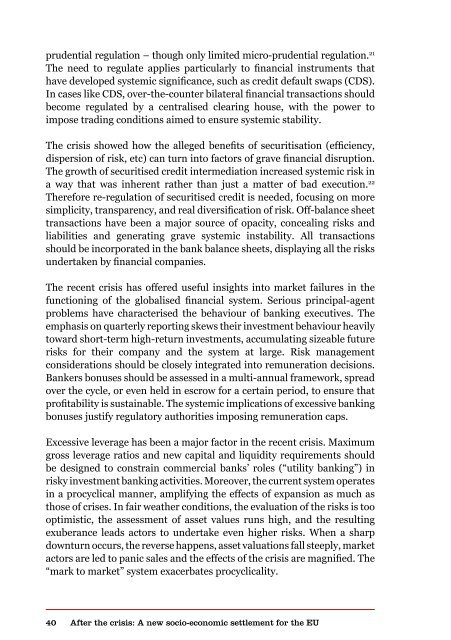Authors Iain Begg | Gabriel Glöckler | Anke Hassel ... - The Europaeum
Authors Iain Begg | Gabriel Glöckler | Anke Hassel ... - The Europaeum
Authors Iain Begg | Gabriel Glöckler | Anke Hassel ... - The Europaeum
Create successful ePaper yourself
Turn your PDF publications into a flip-book with our unique Google optimized e-Paper software.
prudential regulation – though only limited micro-prudential regulation. 21<br />
<strong>The</strong> need to regulate applies particularly to financial instruments that<br />
have developed systemic significance, such as credit default swaps (CDS).<br />
In cases like CDS, over-the-counter bilateral financial transactions should<br />
become regulated by a centralised clearing house, with the power to<br />
impose trading conditions aimed to ensure systemic stability.<br />
<strong>The</strong> crisis showed how the alleged benefits of securitisation (efficiency,<br />
dispersion of risk, etc) can turn into factors of grave financial disruption.<br />
<strong>The</strong> growth of securitised credit intermediation increased systemic risk in<br />
a way that was inherent rather than just a matter of bad execution. 22<br />
<strong>The</strong>refore re-regulation of securitised credit is needed, focusing on more<br />
simplicity, transparency, and real diversification of risk. Off-balance sheet<br />
transactions have been a major source of opacity, concealing risks and<br />
liabilities and generating grave systemic instability. All transactions<br />
should be incorporated in the bank balance sheets, displaying all the risks<br />
undertaken by financial companies.<br />
<strong>The</strong> recent crisis has offered useful insights into market failures in the<br />
functioning of the globalised financial system. Serious principal-agent<br />
problems have characterised the behaviour of banking executives. <strong>The</strong><br />
emphasis on quarterly reporting skews their investment behaviour heavily<br />
toward short-term high-return investments, accumulating sizeable future<br />
risks for their company and the system at large. Risk management<br />
considerations should be closely integrated into remuneration decisions.<br />
Bankers bonuses should be assessed in a multi-annual framework, spread<br />
over the cycle, or even held in escrow for a certain period, to ensure that<br />
profitability is sustainable. <strong>The</strong> systemic implications of excessive banking<br />
bonuses justify regulatory authorities imposing remuneration caps.<br />
Excessive leverage has been a major factor in the recent crisis. Maximum<br />
gross leverage ratios and new capital and liquidity requirements should<br />
be designed to constrain commercial banks’ roles (“utility banking”) in<br />
risky investment banking activities. Moreover, the current system operates<br />
in a procyclical manner, amplifying the effects of expansion as much as<br />
those of crises. In fair weather conditions, the evaluation of the risks is too<br />
optimistic, the assessment of asset values runs high, and the resulting<br />
exuberance leads actors to undertake even higher risks. When a sharp<br />
downturn occurs, the reverse happens, asset valuations fall steeply, market<br />
actors are led to panic sales and the effects of the crisis are magnified. <strong>The</strong><br />
“mark to market” system exacerbates procyclicality.<br />
40<br />
After the crisis: A new socio-economic settlement for the EU

















